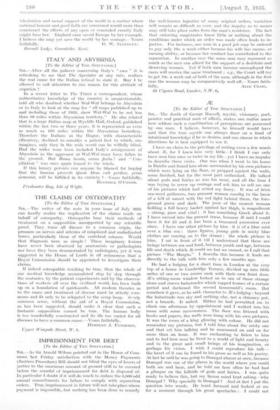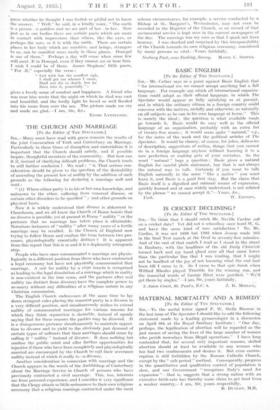[To the Editor of TIM SPECTATOR.] Sin,—The death of George
Russell, mystic, visionary, poet, painter and practical man of affairs, makes one realize anew how seldom such a combination of. perceptions are possessed by one man. I. believe, however, he himself would have said that the true mystic can always draw on a fund of intuitional knowledge if he so desires, and can choose in which directions he is best equipped to use it.
I have no claim to the privilege of writing, even a few words about .TE, for I knew him very little—I think I can only have seen him once or twice in my life—yet I have an impulse to describe these visits. One was when I went to his home in Dublin and found him alone surrounded by his own pictures which were lying on the floor, or propped against the walls, some finished, but for the most part , unfinished. He talked about gods and fairies as was his wont, and all the time I was trying to screw up courage and ask him to sell me, one of his pictures which had seized my fancy. It was of Irish sea-weed gatherers, two peasant women coming to the brow of a hill at sunset with the red light behind them, the fore- ground green and dark. The pose of the nearest woman -holding a full heavy basket against her thigh, is magnificent —strong, pure and vital ; it has something Greek about it. I have moved into the present tense, because .7E said .I could have it for £6 and it has been a treasured possession ever since. I have one other picture .by him—it is of a blue mist over a blue sea : three figures, young girls in misty blue clothes arc coming on to the strand : the whole picture is blue. I sat in front of it till I understood • that there are beings between sea and land, between youth and age, between life and death which lE could see but we cannot, so I call that
I describe this because it leads, me picture " The Margin." directly to the talk with him only a few months ago.
He had a lodging for a short time in London at the very top of a house in Cambridge Terrace, divided up into little suites of one or, two rooms each with their own front door. Ars sitting-room window looked on to one of those strange stone and stucco balustrades which topped houses of a certain period and darkened the second housemaid's room. But somehow it gave, as he said, character to ./E's. lodging :.beyond the balustrade was sky and nothing else, not a chimney pot, not a branch. It suited. Hither he had permitted me to climb one afternoon by. appointment and I walked into his room with some nervousness. The floor was littered with walls were hung with his own pictures. books and papers, the
It Was the room of a king glowing with colour. He did not remember my pictures, but I told him about the misty one and that set him talking and he murmured on and on for more than an hour. It was enchanting to listen to him and to feel how near he lived to a •world of light and beauty and to the • great and. small beings of his imagination, or perhaps his vision. I wish .I could reproduce his talk— the heart of it can be found in, his prose as well as his poetry. At last he said he was going to Donegal almost at once, because Donegal was one of the places in the world where you could both see and hear, and he told,. me how often -he had had a glimpse on the hillside of gods and fairies. I was quite ready to believe this, but any Saxon mind -kept asking—why Donegal ? Why specially in-Donegal ? And. at last I put the question into words. He leant forward and- looked at .me for a moment through his great spectacles , I could not
guess whether he thought 'I was foolish or pitiful not to know the answer. ," Well," he said, in a kindly voice, "The earth is a person—a goddess and we are part of her—in her. Now 'just as in our bodies there are certain parts which are more in contact with impressions than others, like the eyes, or perhaps the ears, so it is with the. earth. There are certain
places in her body which are sensitive, and beings, strangers to us, can be manifest more easily in those places. Donegal is one of them." Perhaps a day will conic when some few will meet ./E in Donegal, even if they cannot see or hear him. I wish I. could be of them. James Stephens' little poem, " For a," especially the verse : !‘ And with but the smallest sigh, I shall get me whence I Caine, Shall not die to death, but be Born into it, peacefully " :
gives a lovely sense of comfort and happiness. A friend who was near him wrote that the night on which he died was vast and beautiful, and the lordly light he loved so well flooded into his room from over the sea. The picture made me cry and made me glad.—I am, Sir, &c.,
EMTII LYTTELTON.







































 Previous page
Previous page